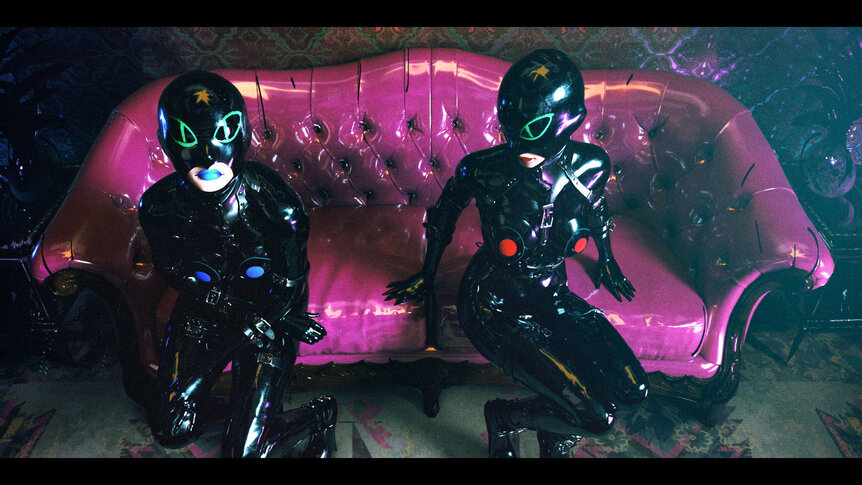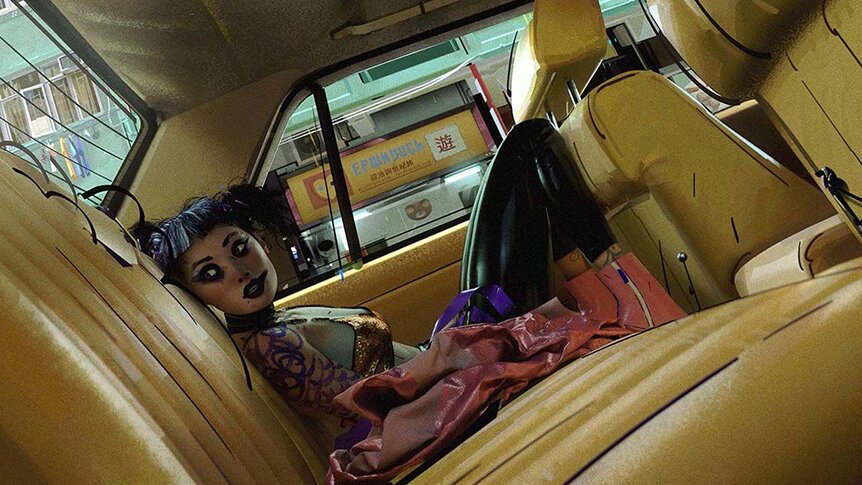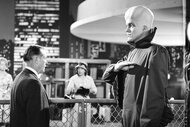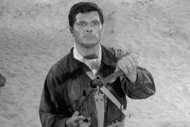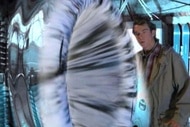Create a free profile to get unlimited access to exclusive videos, sweepstakes, and more!
How Netflix's spectacularly weird Love, Death & Robots came together
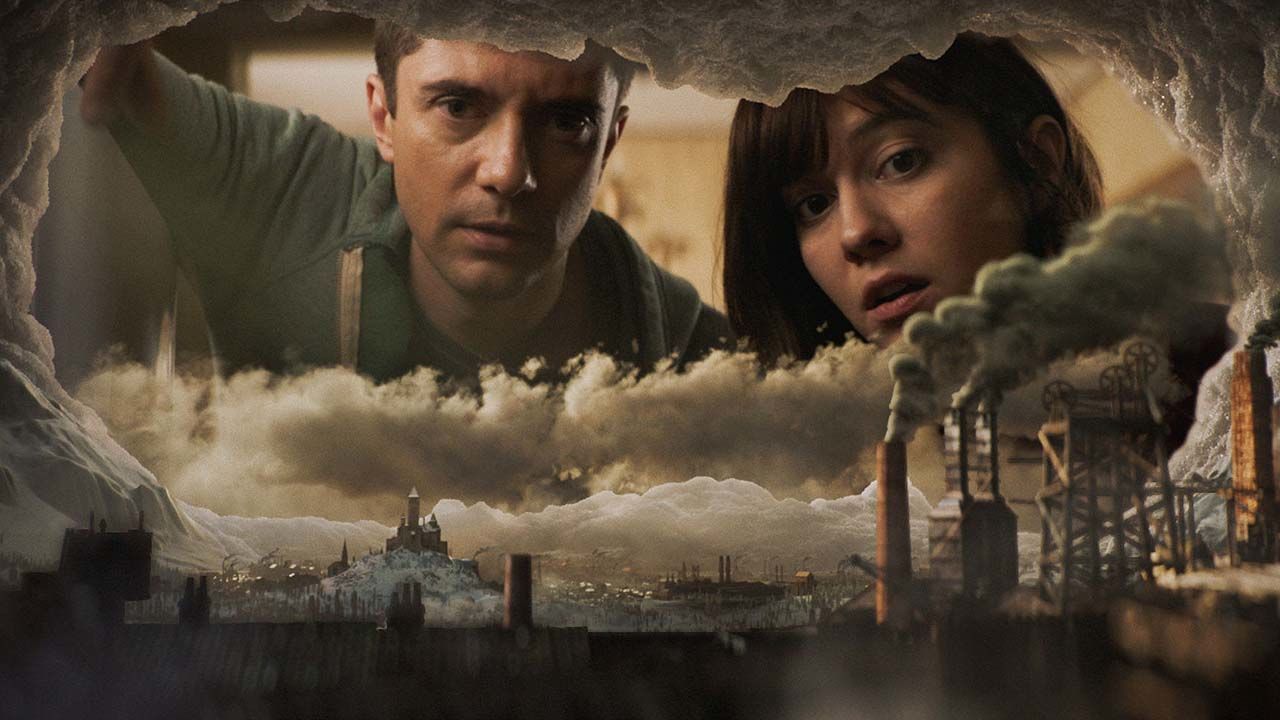
Tim Miller and David Fincher aim to scramble and rearrange the face of TV animation with their ambitious Netflix series Love, Death & Robots, which features short, adult tales told in a variety of styles. At SXSW this week, they debuted six of the 18 shorts that went live on Netflix today. These risque shorts ran the gamut of comedy, thriller, crime, sci-fi horror and everything in-between.
This isn't the first time Fincher has teamed up with Tim Miller. Before Miller achieved fame as director of Deadpool, he owned the Blur animation and VFX studio, and worked as Fincher's guy for opening title sequences. The two even tried to get an animated adaptation of Eric Powell's The Goon off the ground 10 years ago.
In this chat with Tim Miller and his producer and wife Jennifer Miller, we talk about the process of bringing Love, Death & Robots to life, how that could potentially help make their Goon adaptation a reality, as well, and what it was like juggling dozens of directors and production outfits.
I was about 10 when Liquid Television hit and it definitely had a huge impact on me. It opened my mind to what animation could do beyond the Disney style. I got that same kind of vibe from the six episodes of Love, Death & Robots you guys screened last night. Once you start going into the history of animation, then you look at the '70s and you see Ralph Bakshi stuff like Fritz the Cat...
Tim: Fire and Ice, Heavy Metal, yeah. The rest of the world definitely gets adult animation. We're a little behind the curve here in America.
Was that something that compelled you guys to make this, knowing that there is a history to this kind of animation and how effective it can be and how it's an untapped avenue of storytelling?
Tim: Well, you know, I think why something is successful or not, depends on timing. Is the world ready for it or not? And I think for whatever reason here in the States, it just seemed like the right time for it. Those were definitely huge effects on me as a kid. I was at Heavy Metal midnight screenings and I wanted to be an animator, so the idea that I didn't have to do Yogi Bear cartoons was super appealing.
Netflix is your home for this. What was the process like setting up this series there? Was it something where they were on board right away or did it take some convincing?
Jennifer: They were great collaborators. Definitely. They were like a hand that's gently in your back guiding you along. I thought that they were courageous in embracing what this piece really could be. There were willing to pioneer a new short-form format that's very different on their platform and I think they're really excited about high-quality animation in short little snackable tidbits of stories.
I think it's also interesting that they're so willing to experiment and that's what we want too. You talk about Liquid Television. It really was innovative and experimental and then when you put stories into that, that are grounded, then it becomes something really different and I think that they embraced that wholeheartedly.
Yeah. I think that's why when people think of Liquid Television they remember Aeon Flux. That had a progression that had something you can follow...
Tim: Barely. (laughs)
I mean, there was still a point A to point B story in a weird, super crazy leather sexy way.
Tim: When we were doing Heavy Metal we had Peter Chung do a segment. He developed a 12-minute story for Heavy Metal that was in that world because we liked it so much.
As a video game fan, I've seen these amazing cut scenes that made me wish we'd see that level of animation and storytelling in a narrative form. You have a few pieces that you screened that feel like that. The "Secret War" segment jumps to mind. Was that something you guys were going after?
Tim: Totally, since that's our world, but it really made a lot of business sense, from production model sense, but also coming from that world we knew all these great... they were our competitors, but we're all friendly and it is kind of a community. So we know all these folks. Even at the genesis of the idea, we knew all these great boutique places. Like Blur is 120 people now. They're not big enough or interested in doing traditional features and yet they have a lot of high-quality artists and great pipelines and they can do anything in the five to 15-minute realm cost effectively because we know the margins for that side of the business.
And you have a lot of artists who are there because they don't want to work at Disney or the traditional talking animal type of animation, but they still love animation. It seemed like the perfect fit for us. We have cool stories, there's a cool company that is interested in doing it, let's put it together.
And Netflix was super open to it. They're just so willing to try things, whereas with traditional studios it's a big risk to do this. It may not work. It may make them look bad. It may cost a lot of money. Netflix says, we don't know if this will work, but we like it. Let's try it. It was a whole different vibe.
Yeah, they have different masters to please. They have subscribers as opposed to having to entice people to go to theater and specifically spend their money on a single project.
Tim: Yeah. I'm not saying studios are filled with people that are afraid because they're not. A lot of great movies are made and a lot of them are innovative and risk-taking, but it's a little different with the casualness that Netflix is able to go out there and take some risks. "Yeah, that looks interesting. Let's do that!" Instead of (whispering) "All right. Let's go..." That fear of walking up to the edge which David (Fincher) and I got when we were trying to do it as a movie early on.
Jennifer: I thought "The Secret War" played so beautifully last night, didn't it? The company that did that, Digic who are in Hungary, they're just fantastic world-builders. The detail was so rich. I really felt like they really pushed the animation style. It was stylized just enough to exaggerate the features to really make those characters grounded in a really great, but not photo-real world. It was really unique. And then just to push up against that fantastic violence. The last battle is just epic.
I don't think you and I talked around the time, but I did talk with both David Fincher and Eric Powell when you all were trying to get The Goon off the ground about ten years ago...
Tim: We have not given up. It will happen.
Watching those episodes from Love, Death & Robots last night I couldn't help but hope that it does well enough for Netflix that maybe they'll go ahead and finally make Goon a reality. I'd love for this to pave the way to The Goon actually happening.
Tim: I think it will only help, but we haven't given up on The Goon. Never have, never will. And I think you'll be happy. Soon. I'm excited about it and I do think all of this helps. It can take a while. I don't think I'm talking out of school, but the last hiccup was Eric had some older business that needed to be cleared out for lawyers to be happy and stuff. I feel it keenly, like if I was a fan and I would go, "These f***ers took my money and what did they do with it?" We did exactly what we said. We have a whole reel. We spent that money and more of our own besides. We have a full reel for the movie. It's going to be great. It's just any movie is a push up hill. For (Love, Death & Robots) David and I tried for 10 years.
Since you tried to get The Goon off the ground you've made one of the most successful superhero movies of all time...
Tim: Which also took five years to do as well, but we never gave up. David never gave up. On this show, literally the weekend Deadpool came out, David called and said, "Okay, you're going to get a little juice off of this and we're going to use that to combine it with my power and we're going to push this forward." The thing that was nice about Deadpool, which David saw, was it was something that everybody said won't work and then they see it not only works but it works well and there's a hunger for this kind of material out there. That was the same door we were pushing against with this R-rated animated anthology. So you can see the corollaries, and I think the same thing will be for The Goon. Why not?
That source material is so fun It's a tragedy that it hasn't happened yet, but I love that you guys are still pushing forward on it.
Tim: David never gives up and I don't either. It's not like I can't give up because I have so much time invested. I just never stopped liking it. I didn't get bored with it. Sometimes you just can't get it done. You hit a wall and you have to find another way around.
Jennifer: I think it's one of the things that makes you successful. You will walk through a wall to get to that project. I've seen you do it. You hang on for years and years. That tenacity is great. You need it, in this business especially.
You're producing all these different shorts and you also directed one of your own. Did you find that there was much a difference when you were directing versus when you're producing the other projects? Did you find yourself in any kind of different mindset?
Tim: I don't think directors make the best producers because it's hard for you not to go, "Well, how would I do this?" or "I would never do that." But I do think from running a studio for years, Blur is almost 25. We have a lot of directors doing projects and I'm used to helping them or, I hate this word, but mentoring some of them or just chiming in and with an opinion when I'm asked. I've never felt like I had to control everything. I'm not that type of guy. And David is definitely not. I mean, we did the Girl With the Dragon Tattoo opening and David was like, "Tell me I'm the best f***ing client you've ever had." I mean it was his vision for what it was, but as far as like saying "No, do this," or "Cut out five frames early," he never said any of that.
In fact, the last review was him saying, "I want to stop by and see it." And I said, "Oh, why?" He's like "'cause it's cool. I just want to come by and see it and I'm in the neighborhood." That's the way he was for the whole project. And I try and be that way. On the other hand, Netflix expects us, Blur, as the hub of this whole enterprise to make something great. If we don't deliver, first David will go, "Dude, what the f***? This sucks." And then secondly, Netflix will go, "Uhhh..." So we feel a sense of responsibility to make sure it hits a certain level of quality, but I think you can do that without being heavy-handed. Maybe you should ask the other directors. (laughs) We only made two or three people cry during the production.
Jennifer: One of your superpowers is finding excellent talent. You would scour through the Internet and find all these great artists to come work at Blur and now you're scouring the Internet to find these fantastic new directors. You gave them a lot of latitude and you set them up for success with fantastic stories and it worked. I think that very excellent hiring of talent really just set you up to be able to let go as a director and let them do their job.
Tim: Timing-wise, it worked pretty well for us. When Netflix said go we had a chunk of time before I had to leave and do The Terminator. We got through the entire story selection process. We got through the entire selection of the directors and studios that were doing the work. We got through the initial presentations of here's what we'd like it to look like and here are our storyboards, and, in some cases, even animatics before I had to say, "See you later!" Terminator was a seven days a week, 24 hours a day enterprise. Jennifer and the production team are involved in all of that as well, so I don't have to worry about that. Blur can do that without any input from me. It was a really great teamwork approach to the whole thing.
When you're dealing with so many different storytellers and companies there's got to be a baseline quality. There's got to be checks in the system to make sure everybody's on the same page. At what point did this quality control come in? Was it right at the very beginning or did it kick in well into development?
Tim: Our process on all but two of these was I would pick the story and develop the script with Phil Gelatt, who's a writer I've worked with a lot. Phil and I would talk about it and Phil would write a draft. He'd do a round or two of that then I would do a polish and then we'd send it to whoever was going to do it. And this was usually before we even picked who was going to do it. It was just, here's the story that works. You can change it, you can make it better, assuming we all agree that you're changing it and making it better, but at least we know that there's a baseline of what I think which quality storytelling. That's kind of a nice safety net. You could always go, "Yeah, you're drifting off here a little bit."
Despite being one, I think directors are... you have a much higher probability of encountering assholes in the directing division then in pretty much any other part of filmmaking. There's a lot of ego. Less, for sure, in this group that we worked with, but you want to be able to make sure that nobody feels like, "Now it's my chance to show what I can do!" No. Now's the chance to contribute to what should be a great gestalt for the show. It's not your story to do whatever you want with.
That may sound controlling, but I don't think so. I mean, I never felt that way doing game cinematics. It's, it's not like I was going to say, "You know what? My vision of Batman is he wears white and I think as an artist it's my prerogative to do that." F**8 you, Batman wears a f***ing black suit! You're not going to change that. So why should this be any different? But I don't think it was heavy handed. And then when you get into the production of it...
Jennifer: We started out with thousands of stories that we read, so when you talk about the numbers it's not really controlling, it's like funneling this down into the right mix. It is a smorgasbord of lots of different stories, but there are 20 directors, there are 11 countries and when you're funneling that down you do need a process.
Jennifer: But all you're really doing is harnessing the passion. Every single partner on this project, production companies and directors, knew this was a team sport. Animation is a team sport. Ultimately I think it all ended up on that screen. The beauty of them being so passionate about it is that they can have that very focused vision on their story. Then we have the perspective to say, "You know what? We can see a little tweaking here, a little editing there to just fine tune it and make it great and fit within that whole series."
I think the nice thing too is that you've got the branding and the design methodology of slot machines, a sense of variety, right? You don't know what you're going to get at any given time. You got a little surprise. It's unexpected. And I think that folded it all together in a nice, neat package. So when we talk about controlling it, I don't know that controlling is the right word. Do you know what I mean? Organizing maybe.
Each director is responsible for their story, but we're responsible for that and how it fits into the whole show.
Love, Death & Robots debuts today on Netflix.
